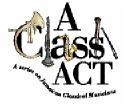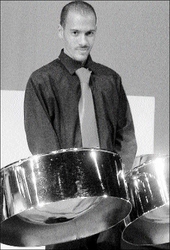

David Aarons ... the mystery of the steel pan drew me in.- Contributed
Few musicians are such masters of their art that they not only play, compose and teach music, but also make their musical instrument. David Aarons is one of the few.
Ironically, he began his musical career with reluctance.
The story of his transformation from a foot-dragging piano student to dedicated pannist (one who plays the steel pan), arguably, has as its moral, "Parents know best."
When he was nine years old (in 1996), Aarons told The Sunday Gleaner, he was instructed he should begin piano lessons.
At the time, he admitted, "I never had, or showed, the slightest interest in the piano, but my parents decided that it would be good for me to take lessons. I went to these lessons dragging my feet for a few years until I gradually began to open up to them."
Momentous decision
His interest in music turned to devotion when he discovered the steel pan and it continued to grow until February 2005, when he made a momentous decision - music would be his career. His life then began snowballing.
Aarons now has a first-class honours bachelor's degree in musical arts (the steel pan being his primary instrument) from the University of the West Indies (UWI), St Augustine, Trinidad and Tobago; is an experienced performer, having played in several leading steel bands during the three years he lived in Trinidad as well as with steel bands in Jamaica; is now a lecturer in steel pan music at the Edna Manley College for the Visual and Performing Arts; and, additionally, makes and tunes pans for various steel bands in Jamaica.
He also composes music for the steel pan. His work, Likkle Dancehall Fugue in D Minor, was one of the more enjoyable items played at the UWI Panoridim Steel Orchestra at last month's recital, The Art of Steel, at the Philip Sherlock Centre for the Performing Arts, UWI, Mona.
His interest in composition began when he was 12 and attending St Andrew Parish Church. He recalled: "I saw someone playing the steel pan at my church and decided that if I ever got an opportunity to play it I would. I thought it was such an interesting instrument and I think the mystery of it drew me in."
When the steel band was formed, Aarons joined immediately, but continued to take piano lessons. On being encouraged to write parts for the pans, he consented when he realised that "creation could take place (even with his) limited knowledge of music".
A few years after, he started playing with the church band, the once reluctant musician began desiring more challenging music. A Panoridim concert gave him an idea.
Aarons said: "I decided that I wanted to join that steel band. A friend of mine who is a member of Panoridim advised me to join, even though I was not a UWI student." Aarons asked if he could join the ensemble, was accepted, and so, in 2003, passed another milestone on his musical journey.
The following year, he participated in the biennial World Steel Band festival with UWI Panoridim in the ensemble category in Trinidad and Tobago.
In the competition, Aarons explained, "Bands have to play two pieces, a test piece, which is set for all bands, and a piece of choice. One of these pieces is usually a classical one, while the other may be a calypso or something composed by a West Indian composer."
Invaluable experience
He found the experience invaluable. "My eyes were opened to the possibilities of the instrument. The highlight of that particular trip to Trinidad was watching the finals of the solo steel pan category in the World Festival. The abilities of the players were unlike anything I had ever seen and this inspired me to take my own abilities further."
By February 2005, he had decided on a music career, and thanks to an ICWI scholarship, he embarked upon a two-year steel-pan tuning course in Trinidad at Panland Trinidad and Tobago Instruments Ltd.
This course offered a hands-on approach, which focused on pan making and tuning of all steel pan instruments. Upon completion of the course, he was offered employment at the factory where he then worked as a pan maker and tuner.
The work involved, Aarons told The Sunday Gleaner, was "laborious".
"Hammers of different sizes," he said, "are used to beat a regular oil drum into a musical instrument. The metal has to be stretched into a bowl shape and notes shaped out. The drum is then cut and then prepared for tuning. Tuning is very technical and involves the use of smaller hammers and the knowledge of where to hit to get the right pitch."
Aarons said that there are others in Jamaica who make pans, but those pans have "different layouts" from the ones from Trinidad.
Along with the tuning course, Aarons read for a bachelor's degree in musical arts and found the most interesting aspect of the programme to be playing with the UWI Festival Steel Ensemble, a sight-reading steel ensemble.
"We played classical music as well as other contemporary genres. Here is where I was exposed to music from various classical composers, both famous and unknown," he said.
"Classical music has been played on the steel pan for many years," Aarons said, pointing out, "The steel orchestra can be likened to a symphony orchestra as the capabilities of the steel pan instrument are similar to those of the stringed instruments of a symphony orchestra. In fact, the National Steel Symphony Orchestra of Trinidad and Tobago has become known for its classical performances."
Dancehall music
But what about a steel band playing dancehall?
"Dancehall music, while not popularly chosen by steel bands, has been played by Panoridim especially, and other bands over the years," Aarons said, and of his own Likkle Dancehall Fugue in D Minor added: "I think using an aspect of our musical culture (dancehall) and blending it with a European style of composition (in this case fugue writing from the baroque era) allows persons in our local context without much exposure to this style of music to appreciate it even more."
He went further on his cross-fertilisation theme. "I would love to be able use local or popular elements to help to foster an appreciation for the masters who came before us as there is much to learn from Bach, Mozart, Chopin, Tchaikovsky and the countless others who spent their lives composing and performing."
Summarising what he hopes his music can do for Jamaica, he said, "I want to help to foster an appreciation for music outside the popular realm while maintaining cultural ties."
His parents could hardly have realised what they were starting when they sent him to that first piano lesson.